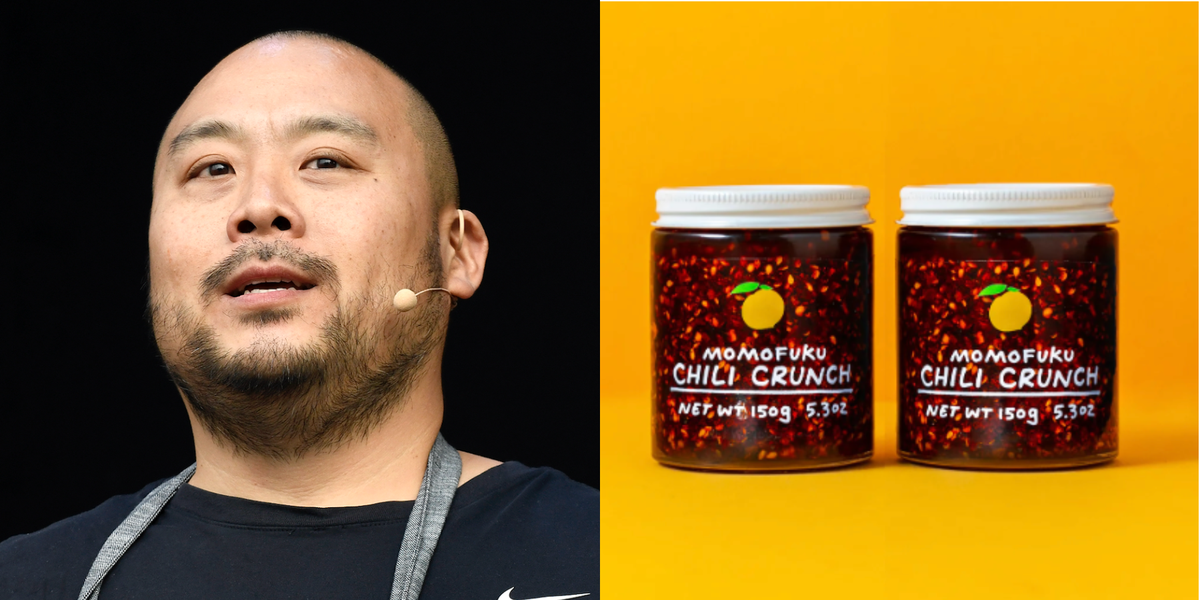
DAVID CHANG APOLOGIZES FOR BEING A 'TRADEMARK BULLY' TO OTHER CHILI CRUNCH BRANDS
Update, April 16: David Chang apologized on his podcast after his company Momofuku was widely criticized for attempting to trademark the term “chili crunch."
“First and foremost, I want to apologize to everyone in the AAPI community who’s been hurt or feels like I’ve marginalized them or put a ceiling on them by our actions,” Chang said in an April 12 episode of his podcast. “There’s a lot of chefs that I’m friends with. There’s a lot of people that are upset, customers, and that’s the last thing—literally the last thing—that I wanted to happen.”
“I spent the greater part of my adult life trying to bring light to Asian food, Asian American food, Asian identity, what it means to be Asian American. I understand why people are upset and I’m truly sorry.”
He continued, clarifying the history of the name of their product, Chili Crunch: “Had I known, or Momofuku known, that chili crunch was a tautology, basically the same as chili crisp, we would have never named it chili crunch."David Chang's spicy, umami-packed chili crunch has become an industry leader, but the Momofuku Goods founder was previously looking to dominate the market altogether—including the term "chili crunch" itself.
The Michelin-starred chef's food empire sent out cease-and-desist letters with the US Patent and Trademark Office (USPTO) to brands that use the phrase "chili crunch" or "chile crunch" on their product labels, the Guardian reports.
New York City-based Malaysian food brand Homiah, soup dumpling purveyor MìLà, and more companies were slapped with the legal letter for using the terms. Chang is reportedly the "owner of all trademark rights" of "chili crunch" and "chile crunch." But some people in the food industry believe the words should be considered too generic to trademark.
According to Homiah founder Michelle Tew, whose Malaysian chili crunch recipe was passed down in her family, the paperwork argues that consumers might confuse her chili crunch with Momofuku's—despite the fact that the products' labels look nothing alike. The cease-and-desist letter states that Tew's company has 90 days to stop using the "chili crunch trademark."
"The phrase that I would use to refer to Momofuku in this case, is a trademark bully," Homiah's lawyer Stephen Coates told the Guardian. "This is a clear case of them picking on small businesses with a letter campaign hoping they’ll cave because of the financial pressure."
Tew described the legal action as a "punch in the gut," and added that, "If Kraft Heinz hit me up [with a cease-and-desist] it would have been so distressing, but the fact that it was Momofuku makes me feel really, really sad."
"I've always been a Momofuku fan and supporter. Momofuku Ssam Bar was the first 'nice' restaurant I visited as a freshman after moving to the US over a decade ago. The next year, I requested a Momofuku Milk Bar Birthday Cake from my sister as my birthday present. And since then, I've stocked my pantry and freezer with countless Momofuku products," Tew wrote on LinkedIn. "I was shocked and disappointed that a well-known and respected player in the Asian food industry would legally threaten me—a one-woman show operating on a much smaller scale—from selling a product that is part of my family's history and culture."
A spokesperson for Momofuku told Today.com that the term "chili crunch" was originally chosen to set the product apart from similar condiments. “When we created our product, we wanted a name we could own and intentionally picked ‘Chili Crunch’ to further differentiate it from the broader chili crisp category," they said.
MìLà co-founder Caleb Wang was also hit with a cease-and-desist letter from Momofuku. "It’s particularly disappointing because the AAPI food founder community is a small, collaborative space, and there’s a sort of ‘we’re all in this together’ mentality," Wang told Delish. He wishes they had a chance for a productive conversation before the legal letters were sent.
"We chose ‘Chili Crunch’ as a straightforward, descriptive name since we had set out to create just that, a chili oil with the crunchiest bits of garlic and shallots in it. This is a widely recognized name in the category and easily understood by consumers shopping for the condiment," Wang said.
Popular chili sauce maker Fly by Jing evaded a cease-and-desist letter from Momofuku thanks to the company's use of the term "chili crisp." But founder Jing Gao is standing up for fellow AAPI-owned businesses.
"The 'chile crunch' trademark should never have been granted. Just like 'chili crisp,' it is a generic and descriptive term for a culturally specific condiment, one that has existed in Chinese culinary culture for hundreds of years," Gao wrote in a post on social media.
Gao went on to proclaim her support for Homiah and others in the "traditionally marginalized" space. "I am disheartened to hear that Momofuku is using a trademark with a validity that is tenuous at best to go after numerous brands including small, minority women-founded businesses. This kind of action, if successful, sets a dangerous precedent for the squashing of fair competition, not to mention how ridiculous it is to try and take ownership of a generic cultural term," she wrote.
2024-04-05T18:49:13Z dg43tfdfdgfd